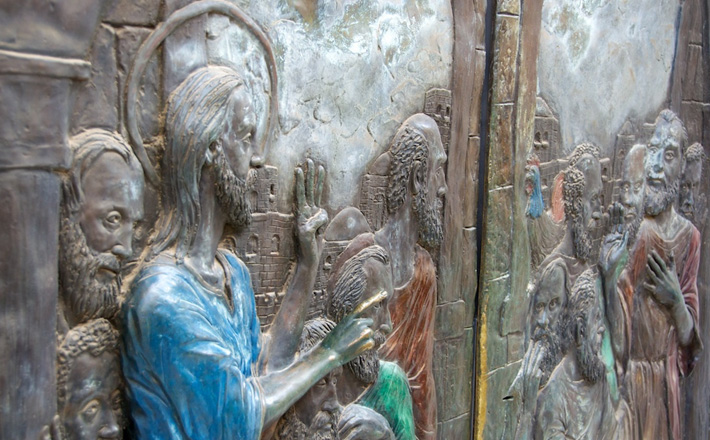Commentary on Philippians 2:5-11
Over the past half century, this has been one of the most studied passages in the New Testament, and probably the most examined passage within the Pauline corpus.
While there is a scholarly consensus that aspects of this text reflect an early Christian hymn (a so-called “Christ hymn”), it is important to understand how it functions within two interrelated contexts: the context of the Roman colony of Philippi and the literary/theological context of Paul’s letter to the Philippians.
In the year 42 BCE Philippi was the site of a decisive battle in a Roman civil war. The armies of the Roman senators who had participated in the assassination of Julius Caesar (March 15, 44), led by Brutus and Cassius, were soundly defeated by the armies of those loyal to Caesar, led by Marc Antony, Octavius, and Lepidus. Following the battle, indigenous landowners were deposed and their properties were given to victorious Roman soldiers as a reward for their loyalty and triumph. As a result, Philippi came to have a strong Roman ethos.
This was strengthened a decade later when Octavius defeated Antony (and Cleopatra) in a subsequent Roman civil war as a number of the troops of Octavius received additional land around Philippi. The climax of this shift to a Roman identity for this city in Macedonia came in 27 BCE when the former Octavius but now Caesar Augustus declared the city to be a Roman colony and renamed it Colonia Julia Augusta Philippensis. Thus, by the middle of the first century when Paul arrived to the Gospel in Philippi and subsequently wrote his letter to the Philippians who believed in the Gospel, the elite of Philippi are the descendants of Roman military leaders. They are also proud Roman citizens who control the city, its economy, its entire competitive system for social honor, and its robust imperial cult, which regularly celebrated the lordship of Caesar.
With regard to the literary context of this passage, two points are noteworthy. First, through the intentional use of military imagery Paul has called on the Philippians to remain loyal and steadfast to the gospel as they suffer because of Christ, just as he does both in his ministry and his imprisonment (1:27-30; on his imprisonment see 1:12-26). Second, in 2:1-4 Paul is making a vigorous request that his audience live out their faith and participation in the Spirit by being fully unified in love and that they focus not on their own self-interests but the interests of others. Thus, when he comes to 2:5, suffering and selflessness are of primary focus in the minds of his audience.
Verse 2:5 serves as the transition to the Christ hymn. Here Paul is calling on the Philippians to have the same evaluative perspective among and toward themselves as is “in Christ Jesus.” Paul’s phrase “in Christ Jesus” has a twofold thrust. First, it refers to the Christ reality in which Christians live, move, and have their being (see such usage in Galatians 3:28; Philippians 1:1).
Thus, Paul is holding up the shared perspective Christians have because they share the same Christ reality. Second, it refers to the person of Jesus Christ (see such usage in 2 Corinthians 5:19; Philippians 3:3) so that Paul is calling on them to have the same perspective as Christ had. The hymn itself presents and celebrates the perspective and action of Christ as well as the perspective and action of God. In many ways the hymn is a status map as it charts the various stages of Christ’s status. While scholars have proposed numerous structures for the hymn, essentially it has two parts. Philippians 2:6-8 charts Christ’s perspective resulting in his humiliating downward status. Philippians 2:9-11 charts God’s perspective resulting in Christ’s honorable and glorious upward status.
The opening declaration that Christ was in the form of and equal to God (2:6) is not so much a claim of his ontological nature akin to the Nicene Creed. Rather, it is a status claim parallel to imperial claims of Caesar being the form and manifestation of divinity on earth. Paul is presenting an anti-imperial Christological claim to Christians living in a highly charged imperial colony. Unlike Roman rulers, Christ does not use such lofty status as an exploitable advantage to increase his own honor, power, and status.
Just the opposite, Christ demonstrates true divine character as the total renouncement of his status and its privileges as an act of self-abandonment or emptying (2:7a). Compared to such honorable high status as being equal to God, Christ now experiences human existence as slave existence (2:7b). Caesar or other Roman elites would never associate themselves with slave existence.
Christ, however, embraces it out of obedience to God’s plan through which God is in the process of defeating all cosmic and human powers which stand in opposition to God. Christ’s ultimate act of humiliation, obedience, and self-abandonment of status is not just his death, but his death on the cross (2:8). Thus crucifixion, which by Roman standards and actions is the epitome of lack of all status, manifests the true, selfless, divine character of both God, who established the divine plan, and Christ, who enacted it.
God’s exaltation of Christ is depicted and celebrated in 2:9-11. God does not simply exalt Christ as a reward for obediently going the way of the cross. Rather God vindicates the way of the cross as the essential character, action, and attitude of God, Christ, and all who participate in the Christ reality. The name which God now bestows on Christ is not Jesus but Lord.
In the Septuagint, kyrios is the name regularly used to translate the Hebrew words adonai and YHWH. Thus God has now given Jesus Christ God’s own name of Lord so that the confession “Jesus Christ is Lord” is both the saving confession for Christians and the acknowledgement of Christ’s cosmic lordship by all who inhabit all the expanses of creation.
Thus the hymn guts the imperial attitude, actions, and claims of the empire, its counterfeit lord, and its ruling elite (including those of the Roman colony of Philippi). At the same time, the hymn establishes and celebrates the divine political and social reality of selflessness, non-exploitation, and cruciformity reflecting God’s true character in and through Christ. In turn, those who now live in the Christ reality also embody Christ’s own attitude and action of selflessness, non-exploitation, and cruciformity. The hymn thus reveals how God has made the crucified Christ the Lord of the universe, and since Christ is Lord, Caesar cannot be.


April 13, 2014